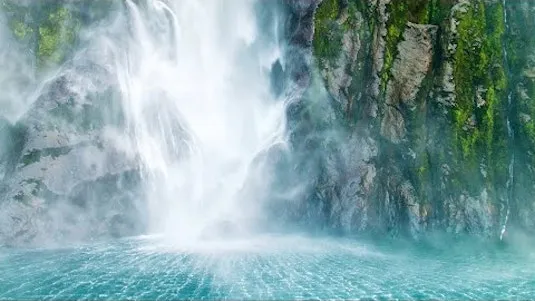
New Zealand Landscape as Culture: Wai (Water) 
This course explores the cultural identities of New Zealand's Indigenous Maori people and their connection to the land's water, or 'wai'. Students will gain an understanding of the importance of awa, or rivers, to Maori culture and how they shape their lives and identities. They will also learn about the spiritual and environmental significance of wai in New Zealand. ▼
ADVERTISEMENT
Course Feature
![]() Cost:
Cost:
Free
![]() Provider:
Provider:
Edx
![]() Certificate:
Certificate:
No Information
![]() Language:
Language:
English
![]() Start Date:
Start Date:
Self paced
Course Overview
❗The content presented here is sourced directly from Edx platform. For comprehensive course details, including enrollment information, simply click on the 'Go to class' link on our website.
Updated in [March 06th, 2023]
This course, New Zealand Landscape as Culture: Wai (Water), provides an exploration of the cultural identities attached to New Zealand's water, or 'wai'. Students will learn about the lives and identities of Indigenous Māori people who can trace their ancestry to their awa, or river, as well as the European, Pākehā perspectives on water. The course will discuss how the different cultures interpret and relate to water, and delve below the surface to look at the unique geology that has created our watery nation, and the taonga (culturally prized possession) found within these waters. Additionally, the course will investigate the political, cultural and economic dynamics of our waterways, and the implications of colonisation by the British in the nineteenth century for the management of water resources. Students will hear from Dr Maria Bargh (Te Arawa and Ngāti Awa) and Professor Lydia Wevers, as well as other experts, to gain an understanding of the Māori world view and Pākehā, or European, New Zealand culture. Through this course, students will be encouraged to think about landscape as an expression of culture, and transfer these ideas to the landscape they live in.
[Applications]
Upon completion of this course, students can apply their knowledge of New Zealand's water and cultural identities to their own landscape. They can explore the geology and taonga of their own area, and consider the political, cultural and economic dynamics of their local waterways. Students can also reflect on the implications of colonisation on their own landscape, and how this has shaped the ownership and status of water. Finally, students can use the knowledge gained from this course to think about landscape as an expression of culture.
[Career Paths]
1. Water Resource Manager: Water resource managers are responsible for the management and protection of water resources. They work with local, state, and federal governments to develop and implement policies and regulations that protect water resources. They also work with communities to ensure that water is used responsibly and sustainably. As the demand for clean water increases, the need for water resource managers is expected to grow.
2. Environmental Scientist: Environmental scientists study the environment and its components, such as air, water, and soil. They use their knowledge to develop solutions to environmental problems, such as pollution and climate change. They also work to protect natural resources and ecosystems. As the world becomes increasingly aware of the need to protect the environment, the demand for environmental scientists is expected to grow.
3. Water Quality Technician: Water quality technicians are responsible for monitoring and testing water sources to ensure that they meet safety standards. They use a variety of methods to test water for contaminants, such as bacteria, chemicals, and other pollutants. They also work to identify sources of contamination and develop solutions to reduce or eliminate them. As the need for clean water increases, the demand for water quality technicians is expected to grow.
4. Water Conservation Specialist: Water conservation specialists work to reduce water waste and promote water conservation. They work with local governments, businesses, and communities to develop and implement water conservation strategies. They also work to educate the public about the importance of water conservation and the need to protect water resources. As the world becomes increasingly aware of the need to conserve water, the demand for water conservation specialists is expected to grow.
[Education Paths]
Recommended Degree Paths:
1. Environmental Science: Environmental Science is a field of study that focuses on the interactions between the physical, chemical, and biological components of the environment. It is a multidisciplinary field that combines aspects of biology, chemistry, physics, geology, and other sciences to understand how the environment works and how it can be managed. This degree path is becoming increasingly important as the world faces environmental challenges such as climate change, pollution, and resource depletion.
2. Cultural Studies: Cultural Studies is an interdisciplinary field of study that examines the relationships between culture, power, and identity. It looks at how culture is produced, consumed, and experienced, and how it shapes our understanding of the world. This degree path is ideal for those interested in exploring the cultural identities attached to New Zealand’s water, and how different cultures interpret and relate to water.
3. Geography: Geography is the study of the physical and human features of the Earth’s surface. It is a multidisciplinary field that combines aspects of physical and human geography, as well as environmental science, to understand the relationships between people and their environment. This degree path is ideal for those interested in exploring the unique geology that has created New Zealand’s watery nation, and the taonga (culturally prized possession) found within these waters.
4. Political Science: Political Science is the study of the theory and practice of politics and government. It is a multidisciplinary field that combines aspects of history, sociology, economics, and law to understand the dynamics of politics and government. This degree path is ideal for those interested in exploring the political, cultural, and economic dynamics of New Zealand’s waterways, and how these can be managed to ensure that cultural, economic, and environmental imperatives are respected.
Course Provider

Provider Edx's Stats at AZClass
New Zealand Landscape as Culture: Wai explores the cultural identity of New Zealand's indigenous Maori people and their connection to the land and water. Students will learn about the importance of awa or rivers to Māori culture and how they shape their lives and identities. They will also learn about the spiritual and environmental significance of the Wai in New Zealand. Learners will learn about the life and identity of the indigenous Māori, who can trace their ancestry back to their awa, or river, and the European perception of water.
Discussion and Reviews
0.0 (Based on 0 reviews)
Explore Similar Online Courses

Fundamentals of Data Analysis for Big Data

Affinity Photo: Digital Painting a Character

Python for Informatics: Exploring Information

Social Network Analysis

Introduction to Systematic Review and Meta-Analysis

The Analytics Edge

DCO042 - Python For Informatics

Causal Diagrams: Draw Your Assumptions Before Your Conclusions

Whole genome sequencing of bacterial genomes - tools and applications

Mining Engineering

The Future of Mining?


Start your review of New Zealand Landscape as Culture: Wai (Water)